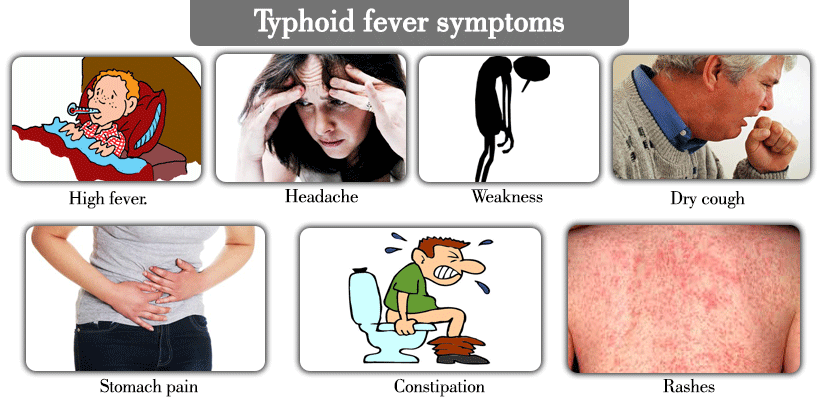
What is typhoid fever? Typhoid fever is a bacterial disease, caused by salmonella typhi, which can be spread through the ingestion of food or drink contaminated by the faces or urine (less common) of infected people.
Typhoid fever occurs predominantly in association with contamination of sewage to the water supply and poor hygiene; flying insects may also transfer bacteria to food. Shellfish, particularly oysters, grown in polluted water and fresh vegetables grown on soil fertilised or contaminated by untreated sewage are other possible causes.
The bacterium usually enters the body through the mouth by the ingestion of contaminated food or water, penetrates the intestinal wall, and multiplies in lymphoid tissue; it then enters the bloodstream and causes bacteremia, the Salmonella typhi bacteria can then be identified in stool or blood samples.
About 22 million cases of typhoid fever and 200,000 related deaths occur worldwide each year according to The Centers for Disease Control and Prevention (CDC). Untreated, the disease can last for a month.
The serious complications of typhoid fever generally occur after 2–3 weeks of illness and may include intestinal hemorrhage or perforation, which can be life threatening. Talk to your doctor about vaccination of typhoid fever and follow good hygiene such as washing your hands regularly before eating, handling food and after going to the toilet, as typhoid is less common in areas where regular hand washing is practiced.
Because the typhoid vaccine is not 100 percent effective, it is important to use preventative measures against the disease which can also assist in preventing diarrhea, cholera and hepatitis A. Talk to your doctor about your typhoid fever risk.
Remember: Typhoid fever is most common in parts of the world that have poor sanitation and limited access to clean water. Don’t forget to wash your hands before eating, preparing food and after going to the toilet.
What are the symptoms of typhoid fever?
Some people may not experience any symptoms, however, can range from mild to severe and can include:
- Fever that can reach 39-40C
- Cough
- Constipation or diarrhea
- Headache
- Stomach pain
- Rash with rose-colored spots
- Lethargy
- Loss of appetite
- Enlarged liver and spleen
- In severe cases confusion, intestinal hemorrhage or perforation can occur which requires emergency care.
Tip: If typhoid fever is suspected see your doctor quickly for a diagnosis because the longer you wait, the higher your risk of complications.
Typhoid fever diagnosis and treatment
If typhoid fever is suspected, it is important to see your doctor for a health evaluation immediately. Your doctor can diagnose typhoid with a stool or blood sample which can show a presence of typhoid bacteria.
Typhoid fever is treated with antibiotics; however, resistance to common antibacterial is widespread, and you may continue being a carrier of the disease without showing further symptoms known as a “healthy carrier state” and continue to infect others. More serious cases of typhoid fever may require hospital admission.
Even if your symptoms have passed, it is still important to get re-tested by your doctor, especially those who work with food, children or the elderly. Do not return to work until your doctor has advised it is safe to do so. If typhoid fever is suspected, see your doctor for a health evaluation quickly.
Tip: It is important to finish your course of antibiotics even if you feel better. Re-visit your doctor for further testing to ensure the bacteria has been cleared from your system.
Prevention of typhoid fever
Get vaccinated: Ask your doctor about the typhoid vaccine, this will either come in a pill form or in an injection. Your doctor will decide which one is right for you. As the vaccination is only 30-70 percent effective in the first two years even though it may have some effect for up to seven years, preventative measures should still be considered such as:
Wash your hands often: before eating, preparing food, and after using the toilet. If soap and water aren’t available, clean your hands with hand sanitizer and then wash your hands as soon as you can.
Keep your hands off: Don’t touch your eyes, nose or mouth. If you need to touch your face, make sure your hands are clean.
Avoid contact with those who are sick: Try to avoid close contact, such as kissing, hugging or sharing eating utensils or cups with people who are sick. If you are sick, show some courtesy to others and stay home.
Water safety: Drink bottled water that is sealed if safe tap water isn’t available. Do not drink untreated water, including ice and drinks mixed with untreated water.
Food Safety: if you are in doubt about the safety of your food, cook it, peel it or forget it.
Contact us if you require more information or have any questions. info@portmoresbygeneralhospital.com
